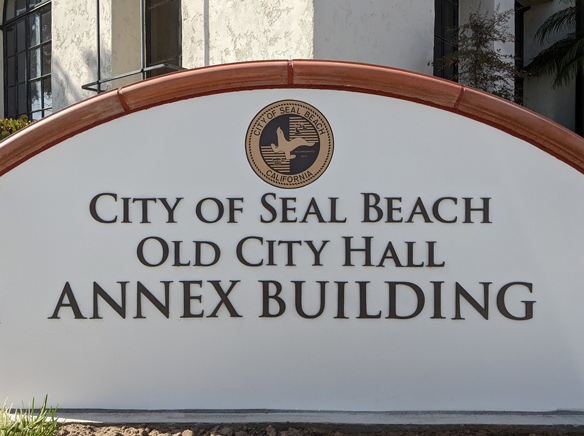The Ad Hoc Parking Committee on Thursday, Feb. 1, voted to recommend against paid parking on the curb on Main Street.
The vote was 5 to 3. The dissenting votes were cast by District One Council Member Joe Kalmick, and committee members Margo Wheeler, and Matthew Terry
Few people attended the meeting on Thursday, Feb. 1. According to City Clerk Gloria Harper, four people were watching the meeting on YouTube. Only two members of the public spoke and one of them was a sitting council member.
Both District Two Council Member Tom Moore and Main Street business representative Rob Jahncke called for the Parking Committee to continue. Both Moore and Jahncke opposed paid parking. Jahncke proposed parking polices in the event the City Council ultimately votes in favor of paid. Committee member and Vice Chair Ken Husting preferred a recommendation against paid parking, with the suggestion that if the council disagreed, the council should send the matter back to the Parking Committee.
Ultimately, the committee went with the recommendation against paid parking.
“Yes is no, correct,” Moore asked.
That was confirmed.
More than one committee member found it confusing to vote “yes” to say “no” to paid parking.
Member Bill McDannel, who was appointed by Council Member/Mayor Schelly Sustarsic, changed his vote from “no” to “yes.”
City Clerk Gloria Harper counted the final vote at 5-3 in favor of the motion.
It will now be up to the City Council to decide the issue.
Public comments
During the public comment part of the meeting, District Five Councilman Nathan Steele argued in favor of paid parking on Main. He distributed to the council a 16-page analysis that argued “Paid Parking is Good for Business.”
Steele also raised concerns about the possibility of the city going into a deficit. (See “Are deficits in the city’s future?” at sunnews.org.) At the Jan. 30, 2024 Strategic Planning City Council meeting, Arenado said the city was not broke.
Resident Lois Miller followed him.
“I know that the city needs revenue and I’m undecided about the meters on Main Street. I would prefer that they be meters that are people friendly,” Miller said.
She said increasing the one-hour parking signs on Main Street would increase parking on Main Street or just make it easier on guests who come to visit.
Committee comments
Space makes it impossible to report what everyone said during the roughly one and three-quarter hour meeting.
The following are a few highlights.
Rob Jahncke, owner of Javatinis Espresso, made the first proposal. He recommended no paid parking on Main Street. However, he recognized that the issue was bigger than Main Street and suggested guidelines if the council decided in favor of paid parking to meeting the city’s financial needs.
Jahncke pointed out that Station 17 and Old Town Café were closed and vacant.
“It’s not a healthy Main Street at the moment,” Jahncke said.
His proposal included a free one-hour period. “It’s also a great way to ease into it,” he said, referring to paid parking.
Jahncke also proposed that a percentage of parking revenues go back to the Main Street area.
He also said he liked loading and unloading zones. Jahncke suggested the Parking Committee continue to meet on a quarterly basis.
Vice Chair Ken Husting said the committee first needed to decide if they wanted to do paid parking or not. Husting opposed paid parking in Seal Beach.
Moore argued against paid parking. “We will lose our small town atmosphere if we have paid parking signs everywhere,” Moore said. He also said Seal Beach would lose business if there’s free parking available at Second Street. (He was apparently referring to Long Beach).
“It’s free at Sunset Beach and all the local shopping centers,” Moore said.
He also argued Seal Beach was not the only city with free parking.
Kalmick had a different perspective.
“If you were to ask a line up of 100 people and say do you like paid parking you’d have a hundred people say no and so we seem to be very, very much willing to listen to the anecdotal evidence by business owners saying it’s going to put me out of business,” Kalmick said.
“What evidence do we have that that in fact would occur? Whereas we seem to reject we thank Julie and then reject out of hand all of the data that she’s presented to us with regard to data that seems to indicate that paid parking actually can increase sales tax revenue in cities that she has modeled and or worked for,” Kalmick said.
“We want our Main Street to be warm and friendly and yet if you look at our Main Street it’s falling apart,” Kalmick said.
“The trees are out of control, the sidewalks are out of control, the pavement is out of control,” he said.
Citing the city’s budget concerns, he said keeping the city vibrant and welcoming was becoming more and more difficult.
Chair Margo Wheeler said Seal Beach already has paid parking in the downtown area .
“It’s in the lots off street and it’s at the beach,” Wheeler said.
“What it is, is backwards.
“The paid parking, you pay for what’s most important and what’s most important are
the parking spots in front of the stores,” Wheeler said.
“’Cause we already have it. Then, if I want to park further away, it’s cheaper or it’s free but the first time I got down here in recent years I thought jeepers this is all backwards,” Wheeler said.
“So to me it’s a difficult decision. It’s hard for people. They don’t want it. They think it’s a bad thing, but we’re in a weird backward position that I think we need to get over and transition so that we can move forward and in the near future have the downtown that everybody wants,” Wheeler said.




